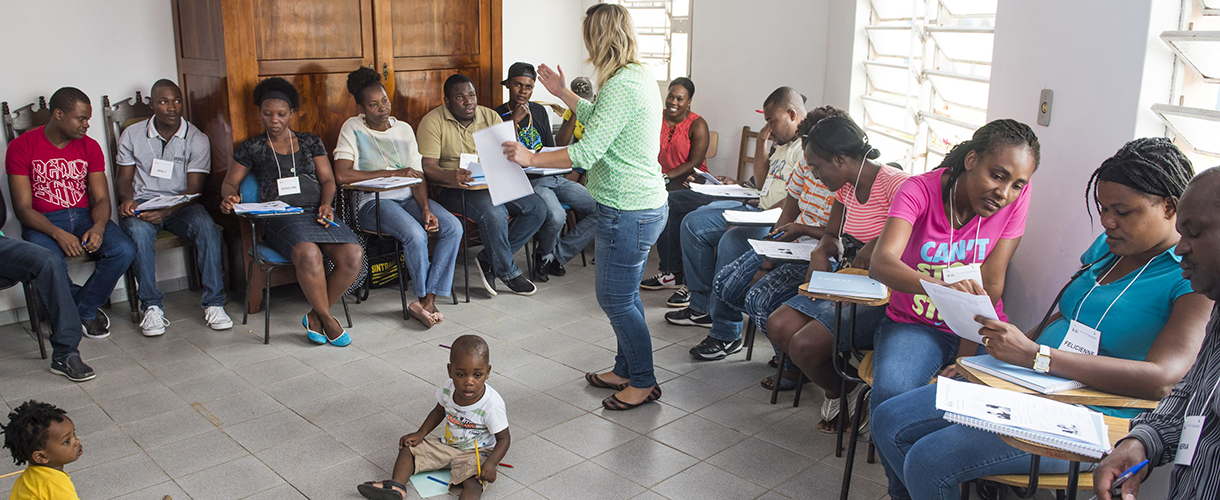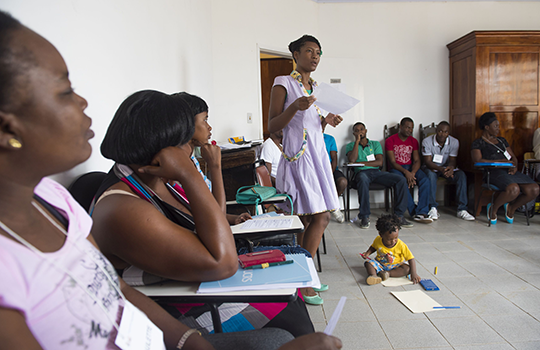Knowledge for everyone
“Welcome to the program! I’m glad you came!” The music played by Rev. João Carlos took on a new meaning when performed chorally by Haitian and Senegalese immigrants from Lomba do Pinheiro, in Porto Alegre. Volunteer professors Cristina Perna and Regina Kohlrausch, from the School of Humanities, and PhD student Graziela Andrighetti filled the 24 students with encouragement. The Director of the Pastoral and Solidarity Center of PUCRS, Br. Marcelo Bonhemberger, and the leading pastoral agent, Rafael Rossetto, played the guitar.
In this relaxed atmosphere, the immigrants and refugees completed PUCRS’ 3-month Portuguese program, on Saturday mornings, at Santa Clara Parish Church, at no charge. The program featured topics on everyday and corporate life. The professors have also worked on curriculum design. For Dr. Kohlrausch, this action has been designed to provide assistance to new arrivals who need the language in order to integrate into the local community. “We’re trying to make their adaptation less painful as they are far from home”, says she.
The idea came out in 2015, at the meetings of the Human Mobility Work Group (created by the Pastoral Center, following an initiative of the Office of Communications and Marketing). Today, several departments of the University are involved. Relying on the support of the Cáritas Archdiocese of Porto Alegre, which provides support to immigrants, the Pastoral proposed collaborative actions with Santa Clara Parish Church. And so, the project came to life.
LOOKING FOR WORK
Nandie Saint Paul, 22, has been in Brazil for two years, with her husband and son. “I can’t find a job. It’s very hard. I used to work as a cook in Haiti”, says she. Communication is a major issue for her. “When I came here, I couldn’t understand a word people said. I have learned a lot from these Portuguese lessons. I think they will be useful for me to find a job”, claims she. Nandie would like to be a secretary, but in her opinion, she would be happy doing anything.
Joseph Bazelais, 31, is faced with a similar problem. He arrived in Porto Velho, in the north of Brazil, three years ago. Then, he headed to Santa Catarina, and started working at a butchery. “I lost my job after two years. I don’t know why. I’ve been living in Porto Alegre for a year now and still haven’t found a job. I apply for several jobs and never get a call back. I haven’t paid rental for four months and I don’t have anyone to help”, reports he. That is the reason why he is attending the Portuguese lessons: he wants to be qualified for the job market. “I can do anything. I have a family in Haiti and things have been tough out there. I wish I could help, but I can’t”. Back in his home country, he used to work in civil construction and gardening.
FELLOWSHIP
Rafael Rossetto claims that initiatives such as this are ingrained in the mission of PUCRS. The Marist Network provides support to 82 countries. “The institution is naturally devoted to promoting human rights, be them in Brazil, Africa or in the Middle East”, explains he.
In addition to the Portuguese lessons, the University has plans to provide counseling sessions to students. “They go through a struggle in order to be able provide for their families”, claims Rossetto. The idea is that Psychology students could play an active role in the treatment. “Developing fellowship during the educational process, either of students or staff, is a challenge the Pastoral is keen to address. An example of such is the Voluntariado Marista. We can’t forget about it”, argues he.
IN BRAZIL
In 2012, a new type of visa was adopted by the Brazilian government: the humanitarian one. Today, there are less than 10,000 known refugees in Brazil. As many as 40,000 are awaiting a decision of the National Committee for Refugees, an agency responsible for reviewing refugee applications. According to Dr Gustavo Pereira, Law School professor, when expats are considered illegal in Brazil, they will have 8 days to leave the country. If they fail to do so, they will become illegal aliens. “As the country does not count on a rigid immigration policy, expats will only be deported if they report to court”, explains he.
The current existing immigration policy reflects 1980’s Statute of the Foreigner. Because it was created under the laws of the dictatorship, it is not very friendly to migrants. “The word ‘foreigner’ per se gives the idea of outsider”, criticizes Pereira. The new regulations are expected to effect changes – the Migrations Act, which is yet to be enacted. “It’s far from excellent, but it’s better than today’s. It looks at it as a human rights rather than national security issue, as stated in the current legislation. There’s nothing new in terms of bureaucracy. The difference lies in the language used”, ponders he.
Learn the difference
Refugees: people fleeing their countries of origin for fear of persecution by virtue of their nationality, political views, social group, race or religion.
Migrants: people fleeing their countries of origin due to economic reasons or natural disasters. Examples of such are the Haitians and Senegalese who live in Lomba do Pinheiro.





